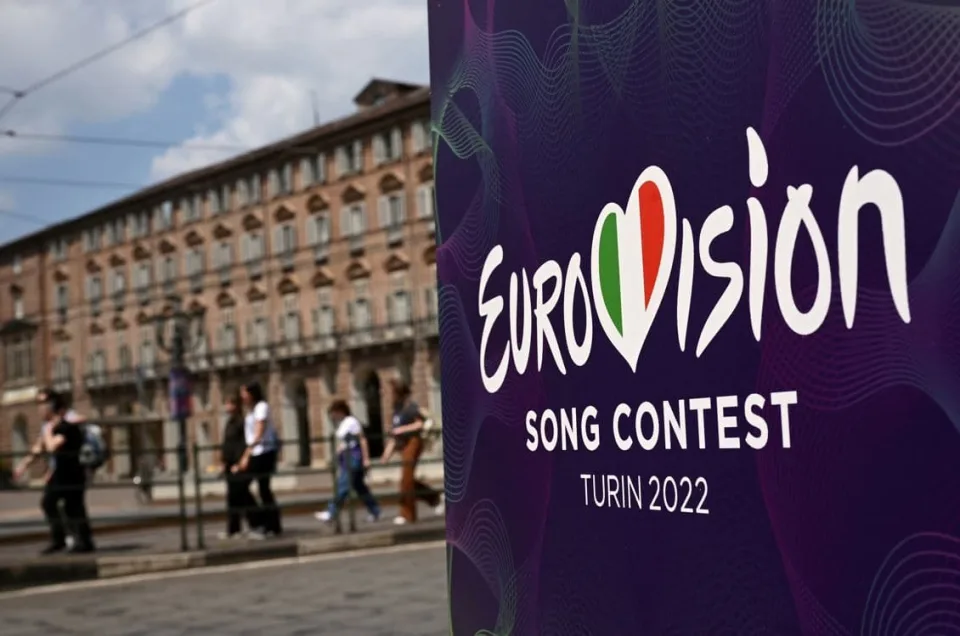Eurovision rejects calls to ban 'Israel' despite boycott threats
The Eurovision Song Contest sparks controversy and faces accusations of double standards, with calls for a boycott arising due to "Israel's" participation amid its genocidal war on Gaza.
-

A banner for Eurovision 2022 in Turin (AFP)
The Eurovision Song Contest has rejected demands to disqualify "Israel" from the competition, despite the death toll of its genocidal war exceeding 19,000 Palestinians, the majority being women and children.
The event, scheduled to be held in Malmo, Sweden, next year, will feature participants from various countries, including the UK represented by Olly Alexander from Years and Years.
While certain UK politicians advocate for a "sustainable ceasefire" in the Middle East, Icelandic musicians are urging their country to boycott Eurovision unless "Israel" is excluded. In response, the Eurovision Song Contest claimed that “the Eurovision Song Contest remains a non-political event that unites audiences worldwide through music.”
Ban Israel from Eurovision! https://t.co/dMynchXRDK
— Dr. Teóríubangsi (@Rafauga) December 12, 2023
Earlier in the month, the Association of Composers and Lyricists of Iceland (FTT) declared their opposition to Iceland's participation in Eurovision 2024 unless "Israel" is disqualified.
FTT, representing artists in the European nation, emphasized, "We all have a duty to take a stand against war and the killing of civilians and innocent children. We always have the choice not to put our name to such things, whether we are individuals or state institutions."
“We owe it to the nations that act with military force to not share with them in an event that is always characterized by joy and optimism.”
Double standards
Since October 7, over 19,000 Palestinians have been killed in Gaza as a result of brutal Israeli airstrikes and ground operations, coupled with a total blockade. Humanitarian organizations and the UN contend that essential supplies such as food, water, fuel, and medical resources are inadequately reaching Gaza. Approximately 85% of the 2.3 million people in the territory have been forced out of their homes, as "Israel' forcibly displaces them southward.
It is worth noting that Eurovision has in the past excluded countries from participation due to global circumstances.
In 2022, Russia faced exclusion from the competition due to widespread criticism from various countries following the war in Ukraine. Russia did not participate in the competition the following year. Initially, the EBU stated that they had no intentions of barring Russia from the event but later reversed their stance. The group claimed to have conducted extensive consultations with its members and decided based on a recommendation from the governing body of the Eurovision Song Contest.
“The decision reflects concern that, in light of the unprecedented crisis in Ukraine, the inclusion of a Russian entry in this year’s contest would bring the competition into disrepute,” they said.
The rejection of calls to ban "Israel" from the competition has raised questions about consistency, especially considering that Russia was excluded from Eurovision in 2022 following the war in Ukraine. Critics argue that these differing decisions highlight double standards in the treatment of participants based on geopolitical issues and wars.
It's noteworthy to mention that the civilian death toll in the Ukraine war is less than half of the civilians killed in Gaza over 75 days, despite the Ukraine war lasting for 1 year and 9 months.
The Eurovision Song Contest organizers face scrutiny over their approach to political considerations in the competition.
Read next: EUROVISION: Does stealing for Ukraine help?

 3 Min Read
3 Min Read










